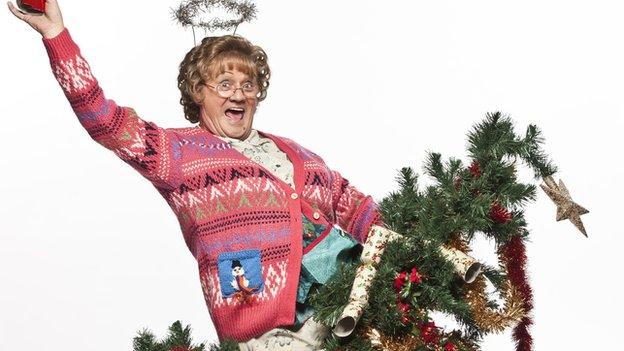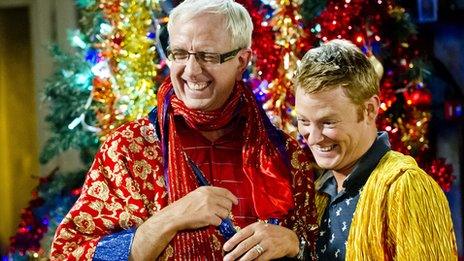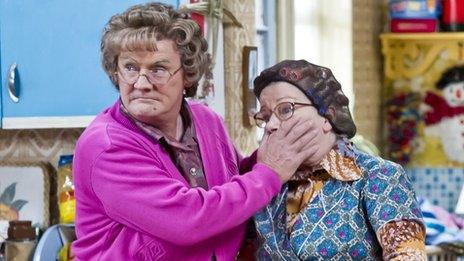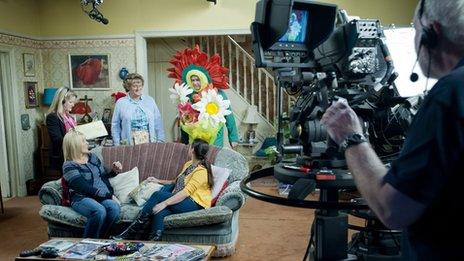Mrs Brown's Boys - 'We are not the Waltons'
- Published

Mrs Brown will have two Christmas specials on BBC One before a new series starts in January
Mrs Brown's Boys has been a surprise success - winning a Bafta for best sitcom and gathering up to eight million viewers on BBC One. It returns for a third series, starting with two Christmas specials on Christmas Eve and Boxing Day. Its creator and star Brendan O'Carroll explains how it took 20 years to become an overnight success.
She is a foul-mouthed Irish mammy who is played by a 57-year-old man. To make matters more confusing, Brendan O'Carroll's real-life wife plays his TV daughter, his TV son's wife is acted by his daughter, and his big sister is his neighbour and best friend in his sitcom.
There are more family connections in Mrs Brown's Boys but it all gets very complicated.
There is no doubt O'Carroll is the head of the family, on stage and off.
But he says: "We are not the Waltons, that's for sure."
He actually added an extra word into the above quote. It begins with the letter f and is a favourite of O'Carroll, both in life and in his comedy.
Despite much of the cast being related, O'Carroll says the Mrs Brown extended family is much larger than that.
Rory Cowan (his TV son Rory), Pat 'Pepsi' Shields (his TV son Mark) and Dermot 'Bugsy' O'Neill (Grandad) are not "blood relations" but they have all worked with O'Carroll and the many incarnations of Mrs Brown for 20 years.
"I'm the youngest of 11 kids, most of those I don't care about as much as I do about Rory," says O'Carroll.
"The same would be for Pepsi and Bugsy."

Rory Cowan (left) has worked with O'Carroll for 20 years.
For anyone not familiar with Mrs Brown - a quick recap.
Struggling Irish writer and performer Brendan O'Carroll created the Dublin widow for Irish radio in the early 90s.
When the actress due to play Mrs Brown did not turn up, O'Carroll, who was only 35 at the time, took on the role himself.
It became a huge success and opened doors for O'Carroll, including writing a 1999 film starring Anjelica Houston.
But he overstretched himself financing another film project and went bust.
Five plays
Mrs Brown was brought back to life for the stage in order to pay his debts.
It was a phenomenal success in Dublin and just over a decade ago made its way to Glasgow, where a series of five plays have annually drawn huge and loyal audiences to the city's Pavilion Theatre.
Glaswegian comedy writer Ian Pattison, the creator of Rab C Nesbitt, told BBC producer Stephen McCrum there was something remarkable happening that he needed to check out.
McCrum travelled up from London to see it and was instantly convinced it would be a TV success.
O'Carroll says: "Afterwards he came back to the dressing room and said 'we'd like to make a sitcom of this'.
"I went 'thanks very much'.

Mrs Brown's neighbour Winnie is played by O'Carroll's sister Eilish
"When he had gone I said I had no idea who he was but people don't just walk in and say they want to make a sitcom.
"'He's probably a janitor', I said."
McCrum was as good as his word and a TV phenomenon was born.
The first series was received sniffily by the critics but the viewing figures were massive for a new comedy show.
The second series has so far picked up five major awards, including a Bafta.
Eight million people watched the last episode of the second series.
O'Carroll says: "You don't really get a sense of what eight million people watching feels like. It is twice the population of Ireland, so I can't even get a concept of that."
And it is not just the number of people watching that has astounded him, it is the intensity of their adoration.
"We kind of know it is funny," he says.
"We've been doing this on the stage so we know there are gags that are going to work.
"But I'm really surprised about how much people love the show."
He adds: "I've never felt that way about any programme in my life."

O'Carroll chose to film the studio at BBc Scotland's HQ in Glasgow
In addition to those who write to say Mrs Brown is the highlight of their week or that it has helped to get them through depression, O'Carroll says he has now had hundreds of letters from the parents of autistic children.
He says: "Letters from people saying thank you for letting us hear our child laugh for the first time ever."
The comedian was so baffled by why he seemed to connect with autistic children that he has put funding into two research projects dealing with autism and learning.
One is an Irish project to buy ipads for autistic children.
He says the technology has revolutionised the way autistic children are taught.
Despite living part of the year in Florida, touring extensively in the UK and filming his TV show in Glasgow, O'Carroll is still very much attached to the Dublin roots from which Mrs Brown springs.
Panel show
In September next year he will begin filming a movie of Mrs Brown, set in Moore Street market.
The script, which O'Carroll says he has not yet had time to write, will involve Mrs Brown becoming an international symbol of the fight against heartless capitalism when she tries to defend her market stall against a property developer.
There was also a pilot made for a Saturday night quiz show in which Mrs Brown was the host, given free licence to "destroy" a panel of celebrities.
O'Carroll says a pilot for the show was made, and it was "hilarious".
But the funnyman turns businessman when he considers how being a panel show star would affect the Mrs Brown brand. It a step he is reluctant to take at the moment.
He says: "You have to think product-wise too, that sounds very mercenary, but we spent a lot of time and a lot of effort building this brand.
"Mrs Brown has become a really strong brand and we did not want to throw it away."
He adds: "I don't care how funny you think you are, people are entitled to think 'oh no, not him again'.
"It might make Mrs Brown more famous but, Jesus, we can't get any more people into the gigs than we do already."
The Mrs Brown stage tour no longer plays venues such as the Pavilion Theatre, having moved to 5,000 seat arenas such as the Odyssey in Belfast.
Real jobs
In 2014, they are booked to go to Australia, where it is the number one show.
O'Carroll says the "family" sometimes just "sit down and giggle" at the incredible success but he insists nobody takes it for granted.
"I think it is because we all had real jobs," he says.
"Bugsy was a window washer, Pepsi was a mechanic, Rory worked in EMI for many years, I was a waiter, Jenny worked in the bank, Eilish worked for Guinness - everybody had real jobs.
"You are always terrified that one day they will find out you are a waiter and they will want their money back. So I think we do appreciate it more than normal."